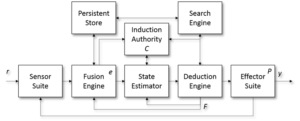Intelligent Control Theory
Human behavior, or, for that matter, all animal behavior is purposeful. Behavior is mediated, and influenced and perhaps shaped by factors that are biochemical or physical, but such factors are insufficient to account for the complexity of all animal behavior.
Darwin discovered, for example, that a complex invisible process called evolution can strongly influence the behavior of animals. He identified and elaborated principles of evolution often captured in the (inadequate) phrase: Survival of the fittest. The important thing to note is that the creatures that participate in evolutionary processes may behave as prescribed, but they may also be largely unaware of the processes that guide their behavior. Hence the processes need not be visible, or even understood by the creatures whose continued existence depends on them.
Our technical approach to understanding and engineering the interface between humans and their systems is grounded in the fundamental principles of evolution and physics, and the engineering disciplines that translate those principles into useful design tools.
We call this approach intelligent control theory. We didn’t invent intelligent control theory. We just recognized its value in engineering complex human-machine systems (“machine” writ large).
Intelligent control theory is a minimalist extension of conventional control theory introduced to every engineering student in the earliest phases of their education. You can read about it in a recent (2016) paper, here. In many important respects, conventional control theory is like the early behaviorist models espoused by B.F. Skinner and others in reaction to the sometimes dubious methods used by cognitive psychologists such as Edward Tolman. The essential difference between behaviorists and cognitivists was the behaviorists’ insistence that the thing studied must be directly observable.
Control theory shares with behaviorism the critical limit that it can only account for what can be directly observed. It describes the behavior of a system precisely. But it cannot account for why a system behaves at all. Conventional control theory can explain the intricacies of interactions among the elements that comprise a bridge spanning a great body of water, but it cannot account for why the bridge is there.
Intelligent control theory expands on the foundation of conventional control theory in a manner that is consistent with the underlying control theoretic model, but makes provision for answering the question why.
As of this date (August, 2017), this page is under construction, but we will return shortly to elaborate why and how intelligent control theory can account for the critical factors that define the human-system interface.
